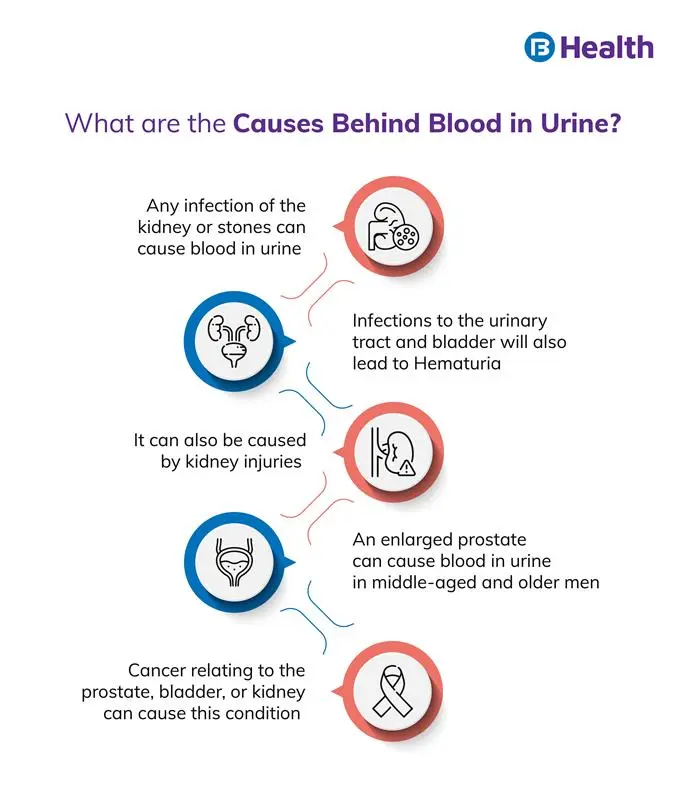General Health | 7 min read
Blood in Urine: Reasons Behind and Ways to Cure It
Medically reviewed by
Table of Content
Synopsis
Blood in urine or Hematuria is of three types. Many underlying illnesses or infections can be the reason behind this condition. It's very important to treat it without much delay to avoid further complications.
Key Takeaways
- Early signs of hematuria may include difficulty urinating, stomach pain, etc
- Even if you find a little trace of blood in your urine, you should consult a doctor as soon as possible
- Blood in the urine can be caused by various underlying reasons, from bowel movement to cancer
Don't freak out, but take it seriously if you find blood in your urine. Hematuria means blood in the urine and is often easily treatable. However, it may also indicate serious issues. When patients first notice blood in their urine, they usually have many questions. This blog gives you an idea about hematuria or blood in urine, its causes, associated concerns, and treatments.
What Does Blood in Urine Indicate?
Healthcare providers classify blood in the urine as gross, microscopic, or dipstick. Gross Hematuria is when there is so much blood in your pee that it can be seen with the naked eye. It can make the colour of toilet water mild pink or intense red. When there is a trace amount of blood in your urine that the human eye cannot see, it is called microscopic Hematuria. To view it, you need a microscope. If oxidizing a urine test strip leads to a colour change, it is dipstick Hematuria. It does not necessarily indicate the presence of blood cells in your urine. Dipstick tests have rather high rates of false-positive results.Additional Read: Bladder Cancer
Factors Responsible for Hematuria
There exists various causes. The source of the blood may vary in several circumstances. Blood can appear in urine from the ejaculate in males, vagina in women, or from a bowel movement in both men and women.
Infection
One of the most frequent causes of Hematuria is infection. The infection could affect your kidneys, bladder, or urinary tract.
This develops when bacteria makes its way up the urethra, the tract that transports urine from the bladder out of the body. The infection may spread to the kidneys or even the bladder. It typically causes pain and the urge to urinate regularly.
Stones
The existence of kidney stones is another common cause of blood in the urine. In this case, crystals made of minerals can be found in your urine. They can form within your bladder or kidneys. Large stones can obstruct the flow of urine, which frequently causes Hematuria and intense pain.
Prostate Growth
An enlarged prostate is a very typical cause of Hematuria in middle-aged and older men. This gland is located close to the urethra and directly below the bladder. As a result, the urethra is compressed when the prostate grows larger. This makes urination difficult and could stop the bladder from emptying. This can lead to a urinary tract infection with blood in the urine.
Kidney Disease
Blood in the urine for females or males can be caused by an inflamed or diseased kidney. This condition may manifest either independently or in conjunction with another condition, like diabetes.
Hematuria can be brought on by post-streptococcal glomerulonephritis, a kidney condition, in 6 to 10-year-old kids. It might appear one to two weeks after a strep infection that has gone untreated. Due to the speedy treatment of strep infections by antibiotics, it is now uncommon.
Cancer
Blood in urine could be a prostate, kidney, or bladder cancer symptom. Advanced cancer cases often have this symptom. However, there might not have been any warning signs previously.
Medications
Blood in urine could be caused by specific drugs. These consist of the following:
Aspirin, penicillin, blood thinners such as heparin and warfarin (Coumadin), and the cancer treatment medication cyclophosphamide.
Other Probable Causes of Blood in Urine
There are a few uncommon causes of Hematuria as well. It could be a symptom of rare blood illnesses like Alport Syndrome, sickle cell anemia, and hemophilia. Blood can also appear in the urine due to intense exercise or shock to the kidneys.
Early Signs
You must seek medical assistance the moment you notice blood in urine because some of its causes might be hazardous. Even a trace of blood in the pee should not be ignored.
Consult a medical professional even if you have frequent, painful, or difficult urination or abdominal pain but do not notice blood in your urine. All of these symptoms could point to microscopic Hematuria.
Seek emergency medical attention if you are unable to urinate, notice blood clots when urinating, or have blood in your urine coupled with any or all of the following symptoms:
- Nausea
- Vomiting
- Fever
- Chills
- Back, side, or abdomen pain

Hematuria Symptoms
Urine with gross Hematuria appears pink, crimson, or brown. Although this color difference is startling, it just takes a trace of blood in urine to induce a color shift. Gross Hematuria often has no associated symptoms, including pain. The presence of blood clots in your urine, however, may cause back or bladder pain. [1] Blood clots could be uncomfortable to travel through the urine or may hurt if they obstruct the pee's flow.
Urine's color is unaffected by microscopic Hematuria, and it normally shows no hematuria symptoms.
Treatment
The true source of your Hematuria must be addressed before you can effectively treat it. Your healthcare professional will work with you to choose the best course of action using the data gathered from your medical records, physical examination, and test findings.
Hematuria Treatment Medicine
- Your doctor will recommend antibiotics for hematuria treatment if it is brought on by infections. The bacteria that are causing the illness are killed by these antibiotics, which should halt the bleeding
- Alpha-blockers and 5-alpha-reductase inhibitors are two kinds of drugs that urologists frequently employ to treat an enlarged prostate [2]
- In the case of cancer, your doctor will administer treatment that is appropriate for the stage and severity of the disease as well as your treatment objectives. These choices could be a combination of monitoring, operation, radiation, immunotherapy, chemotherapy, and hormone treatment
- Your doctor may recommend disease-modifying treatments for sickle cell disease, such as hydroxyurea, as well as pain relievers, antibiotics, and medications that stop blood cells from degenerating or developing sickles
- The doctor could recommend a number of different kinds of drugs for renal illness. These might include diuretics, medications to lower cholesterol and blood pressure, and erythropoietin to help you make red blood cells if you're anemic
- Your doctor might advise hormone-related drugs for endometriosis
Other Methods for Treating the Reasons of Blood in the Urine
- Your doctor can advise surgery if medicine doesn't relieve the Hematuria brought on by an enlarged prostate
- You might require dialysis to remove waste or perhaps a kidney transplant if you have renal disease
How is Hematuria Diagnosed?
If you visit your doctor for Hematuria, they will inquire about the amount of blood you observe and when you notice it during urination. They'll inquire about your urination frequency, any pain you may be feeling, whether you've noticed any blood clots, and the medications you're currently taking.
After that, your doctor will examine you physically and take a urine sample for analysis. If an infection is the cause, the urine test can both verify the presence of blood and find bacteria.
Your doctor may recommend imaging tests like a CT scan, which utilizes radiation to generate a picture of your body. A cystoscopy is another test that your doctor may recommend. A tiny tube is used to insert a camera into your bladder and up your urethra. To identify the source of your Hematuria, your doctor can use the camera to look within your bladder and urethra.
What Are the Complications Pertaining to Blood in Urine?
The following complications may arise if you see blood in the urine.
- If you observe this symptom, You should talk to your health care professional because some of the causes of blood in the urine in men are dangerous.
- Ignoring a symptom that indicates cancer risk can cause tumors to grow and become more difficult to treat. Infections left untreated can eventually result in renal failure
- If an enlarged prostate is the cause of Hematuria, treatment may help to lessen the symptoms. Ignoring it may result in discomfort from frequent urination, extreme pain, and even cancer
Blood might appear in your urine for various reasons, including strenuous exercise and bleeding disorders. If blood cells are detected in your urine sample, your doctor will probably order a few further tests to assist in identifying the underlying cause.
You can schedule an online appointment at Bajaj Finserv Health for general physician consultation and clear all your doubts regarding blood in the urine.
References
- https://www.niddk.nih.gov/health-information/urologic-diseases/hematuria-blood-urine#:~:text=However%2C%20you%20may%20have%20bladder,and%20typically%20has%20no%20symptoms.
- https://www.ncbi.nlm.nih.gov/pmc/articles/PMC5780290/
Disclaimer
Please note that this article is solely meant for informational purposes and Bajaj Finserv Health Limited (“BFHL”) does not shoulder any responsibility of the views/advice/information expressed/given by the writer/reviewer/originator. This article should not be considered as a substitute for any medical advice, diagnosis or treatment. Always consult with your trusted physician/qualified healthcare professional to evaluate your medical condition. The above article has been reviewed by a qualified doctor and BFHL is not responsible for any damages for any information or services provided by any third party.



